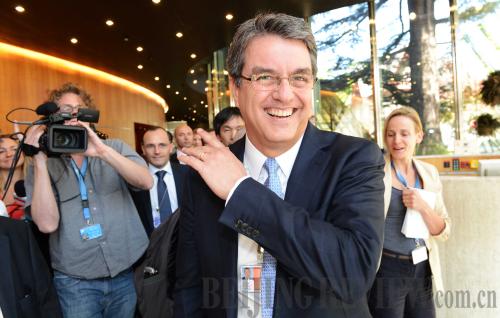|
 |
|
ONWARD: Brazilian diplomat Roberto Carvalho de Azevedo at the WTO headquarters in Geneva, Switzerland, on May 14 after being appointed the next WTO director general (WANG SIWEI) |

The General Council of the World Trade Organization (WTO) approved the appointment of Brazilian diplomat Roberto Carvalho de Azevedo as its next director general in May, meaning that the most important multilateral institution coordinating the global economy will be again headed by someone from a developing country for at least the next four years beginning September 1.
This decision could be interpreted as a new sign that developing countries represented by emerging economies have further increased their voice in Bretton Woods Institutions, traditionally dominated by developed countries, after International Monetary Fund (IMF) structural reforms increased the quota of emerging economies and developing countries.
It also indicates that the global economic governance structure has been evolving gradually in a direction fitting to emerging powers since the outbreak of the international financial crisis in 2008. Despite traditional economic powers' reluctance to change the international monetary, financial and trade rules under which economic crises have been recurrent, they are unable to sustain battered international financial and monetary systems by themselves. Against this backdrop, developed countries seek to continue reaping benefits from the old systems by inviting management experts from developing nations.
Business as usual
A Brazilian's heading of the organization will provide a convenient way for emerging economies to further understand international economic rules; however, it cannot change the nature of the WTO, an economic policy coordinator that mainly serves the interests of developed countries.
Likewise, the United States is still the dominant power after the IMF reform. Though the new president of the World Bank is of Asian descent, he is still an American, and most of the bank's funds come from the United States. That is, despite the Bretton Woods Institutions' inclusion of elements related to emerging markets and developing countries, the institutions remain under the control of developed countries.
The role of the director general is important, but the power of the biggest stockholders cannot be overlooked. This means the coordination of competing interests in the WTO will become more difficult. Quarreling and bargaining between developed countries and developing countries will become even fiercer. In the last five years as Brazil's permanent representative to the WTO, Azevedo has impressed the organization as a champion of the legitimate interests of Brazil. But in the future in his new post, he will have to change his style and become a professional defender of developed countries, which will make BRICS—especially the Brazilians—feel awkward and even left out.
In his acceptance speech, Azevedo pledged that he will work with all members, with unwavering and steadfast determination, to restore the WTO's key role and preeminence it deserves. Ironically, his words also proved that the decline of the WTO has already become an officially recognized fact. In less than 20 years, the once promising international economic organization covering 97 percent of global trade has been embedded with conflicts of interests among members, protracted negotiations and aimless institutional development. The Doha Round talks have nearly become a synonym for "mission impossible."
Launched in November 2001, the Doha Round involves negotiations on agriculture, non-agricultural market access, services, WTO rules, intellectual property, dispute settlement, trade and environment as well as trade and development.
| 